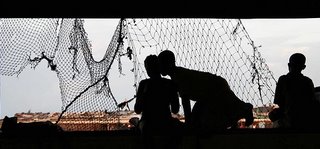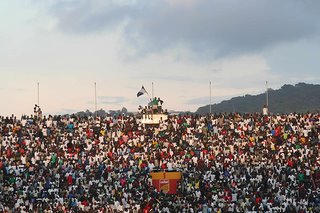Alhassan* lives in a small room behind my house, next to the outdoor kitchen. He is just one of a whole cast of characters that share the downstairs of my house -- I'll introduce you some other time to Adama, Mariatu, Aja, Abdul, Alieu, and the kids -- but is one most responsible for "helping" me.
I know it seems strange to most of you living in the States, but here it is expected that you have People to do things like clean and carry and guard and go-for. Alhassan is my People. He manages the generator and stays up (or sleeps with someone's cell phone) to open the gate when I'm out late. He does my laundry, cleans my flat, and helps with various chores -- like finding someone to connect my new gas burner -- whenever I ask, and finds his own ways to help (like washing my car) if I don't.
Alhassan has quickly become one of my favorite people here (and not just because he does all the chores I hate). He has an enormous, infectious grin and flashes of irreverence and biting humour, and at 17 years old, strikes an odd and earnest balance between teenager and middle-aged worrying mother that is both endearing and utterly amusing.
Last night, Alhassan was hanging out on my balcony chatting about this and that, and he ended up telling me his story. I'd heard only bits and pieces before, and was struck by the confluence of hardship and perseverence -- and by his smile and light manner as he recounted even the most difficult periods.
Alhassan was born in a village in Port Loko, a district not too far from Freetown. His mother left him when he was just a baby -- he knows nothing of her -- and he spent his early childhood with an abusive father and stepmother. At the age of six, after a severe beating and a scary incident involving a large kitchen knife, he left his father's house and went to stay with his grandparents.
Though his grandparents and parents (like nearly two-thirds of Sierra Leoneans) had never been to school, Alhassan decided he wanted an education. His grandparents could not afford the fees -- and didn't really see the value of school -- and so Alhassan began cutting and selling wood to earn money for school. I can picture him: a tiny child (he's none too large even now) perched by the side of the road with a pile of wood, eagerly awaiting customers.
Some years later, Alhassan was slowly working his way through primary school when an uncle offered to bring him to Freetown. He came, but quickly became mired in a sort of domestic slavery for his uncle, who refused to pay for him to attend school.
Still fixated on getting an education, Alhassan spent every free moment (few as they were) downtown, porting for spare change. When he'd raised enough money, he approached his uncle and asked permission to go back to school. The uncle agreed and took Alhassan's money -- but then "ate" it (stole it).
Undeterred, Alhassan went back to town and raised the money again, and this time made sure it went to pay for fees and books and uniform. But things did not improve with his uncle, and eventually Alhassan came to the attention of "Mama Adama" (as he calls her), who offered to let him move into the house where I now live.
With Adama's help and his own hard work (and smarts), Alhassan won admission a few years ago to one of the best secondary schools in Freetown, and this year will take the exam to pass from junior secondary to senior secondary school. He plans to go on to college after that. (Somehow, I don't doubt that he will.)
Stories of hardship like that of Alhassan's childhood are not uncommon here -- and neither, amazingly, is his resilience. It's such resilience, combined with a dose of optimism, good humour, and hard work, that represent this country's best hope.
Also not uncommon is generosity like Mama Adama's. Foreigners are often annoyed by how often they are asked for money here -- not only by beggers on the street, but by coworkers, acquaintances and friends. Many assume they are being taken advantage of because they are white, or foreign. What they don't realize is that asking for help is perfectly acceptable here -- and giving help is almost expected of the "Big Men" who have the power to give.
If you stand with the beggars in Freetown's center, you'll notice that most of the big white SUVs -- NGO or development agency logos emblazoned proudly on their sides-- drive by without a pause, or with just a guilty, apologetic smile. But from the taxis and cars driven by Sierra Leoneans come spare coins and bills, and maybe a bit of normal, everyday conversation.
And if you ask even better-off Sierra Leoneans, many will tell of a time when they had to ask for support from a distant relative, neighbor, or even acquaintance -- help to pay school fees, help to pay hospital fees, help to start a small business. They accept that others will ask the same of them now that the tables have turned, and though they may not always relish the opportunity (and sometimes try to dodge it) I'd guess that most will eventually repay the favour.
A similar tendency is evident elsewhere in Africa. Steve, one of my closest friends here, is from Tanzania and works for an NGO in Salone. He is about my age, unmarried, and this is his first time living outside of Tanzania. Yesterday, Steve told me that he pays the school fees every year for five (5!) of his nieces and nephews back in TZ. Though he grumbles a bit ("It doesn't seem fair -- they're not my kids!") he also wouldn't refuse.
I suppose this generosity has a downside -- after all, hasn't self-interest and the concentration of wealth been a driver of "progress" in the U.S (or has it...), and familial expectations can lead easily to nepotism and corruption -- but it is a much-needed safety net in a country (and continent) where well-being is tenuous at best, and the state is ill-equipped to provide for those in need.
Besides, it makes the world feel a little less harsh.
*
Alhassan is not really named Alhassan.










